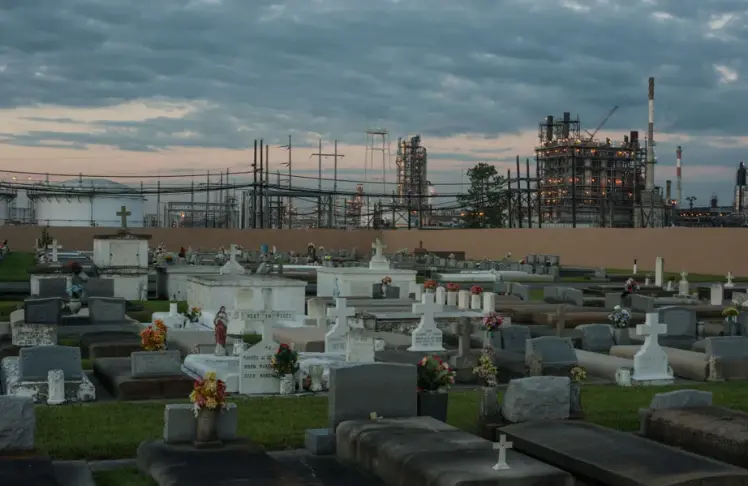
There are certain facts about the industrial corridor that runs along the stretch of the Mississippi between New Orleans and Baton Rouge that cannot be disputed. It’s a fact that, before the Civil War, the area was home to a number of sugarcane plantations; residents in many of the majority Black communities found along the river descended from people who were enslaved to work those cane fields.
It’s a fact, too, that, starting in the mid-20th century, many of the former plantation sites were developed as chemical plants, including many that manufacture plastics. Now, the cancer rates in the predominantly Black communities that sit next to those plastic plants are far, far higher than the national average.
Those facts are the basis not only for the area’s infamous nickname, Cancer Alley, but also the deeply held belief by many who live there that it’s because so many of the residents are Black that the chemical companies sought to build there in the first place. After decades of inaction, the Environmental Protection Agency was poised to do something about those facts last year — but even after a lawsuit tanked an investigation, the very foundation of the EPA’s ability to investigate and act on these kinds of facts without any kind of smoking gun is now at risk too.
After investigating the state permitting of factories in Cancer Alley for violations of Title XI of the Civil Rights Act, President Biden’s EPA was set to actually force changes to the way the Louisiana Department of Environmental Quality operates. But the EPA investigation was dropped after then state attorney general Jeff Landry filed a lawsuit that challenged the mechanism the EPA was using to make the case that Cancer Alley residents were being discriminated against: the disparate impact standard.
Instead of needing to find any kind of smoking gun, the standard allowed the EPA to look at all of the facts about demographics and exposure to carcinogens and infer that Black residents were being disparately impacted by pollution compared to white residents.
Not only did that lawsuit kill the proposed overhaul of LDEQ’s pollution permitting, but according to The Intercept it’s had a chilling effect on many of the EPA’s civil rights investigations — effectively hamstringing what had been a historic aggressive approach from the agency on environmental justice issues under President Biden.
“The lawsuit does not just challenge the EPA’s investigation and potential result of our complaint,” Lisa Jordan, one of the attorneys involved in filing the complaint that led to the EPA investigation of Cancer Alley, told The Intercept. “It challenges the entire regulatory program.” And no one, it seems, wants to see it end up in front of a very unfriendly Supreme Court.
Under Title VI of the Civil Rights Act, every federal agency must ensure that entities given federal money (including both organizations and states), “do not directly, or through contractual or other arrangements, use criteria, methods, or practices that discriminate on the basis of race, color, or national origin.”
Despite that mandate, the EPA has never cut funding over questions of discrimination, which goes to show how historic it would have been to force permitting changes in Louisiana. But in order to investigate any Title XI claims, the EPA needs the disparate impact standard — and with Landry’s lawsuit looming (it was not withdrawn despite the Cancer Alley investigation being scrapped, and he has since been elected governor) and the potential for similar lawsuits in other states, the once-aggressive Biden EPA is suddenly looking very sheepish.
According to The Intercept, other civil-rights investigations have been dropped by the EPA too, including one in Flint, Michigan. There, the EPA was looking into the permitting of an asphalt plant in a predominantly Black neighborhood that was already dealing with elevated asthma rates — and pollution from manufacturing asphalt would have made them higher. The investigation was dropped just days after the EPA abandoned the Cancer Alley one.
But just as Flint is a byword for lead-contaminated water, Cancer Alley is symbolic of the environmental justice movement at large. And as Nayyirah Shariff of Flint Rising, who helped spur the Title XI investigation into the asphalt plant, told The Intercept, “If they can’t get justice? Then it’s just a chilling effect for every other environmental justice community across the country.”















